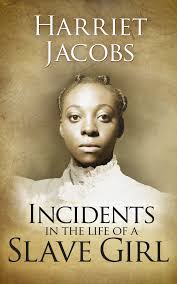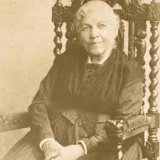Incidents in the Life of a Slave Girl Page #3
Incidents in the Life of a Slave Girl, written by herself is an autobiography by Harriet Jacobs, a mother and fugitive slave, published in 1861 by L. Maria Child, who edited the book for its author. Jacobs used the pseudonym Linda Brent.
She possessed but few slaves; and at her death those were all distributed among her relatives. Five of them were my grandmother's children, and had shared the same milk that nourished her mother's children. Notwithstanding my grandmother's long and faithful service to her owners, not one of her children escaped the auction block. These God-breathing machines are no more, in the sight of their masters, than the cotton they plant, or the horses they tend. II. The New Master And Mistress. Dr. Flint, a physician in the neighborhood, had married the sister of my mistress, and I was now the property of their little daughter. It was not without murmuring that I prepared for my new home; and what added to my unhappiness, was the fact that my brother William was purchased by the same family. My father, by his nature, as well as by the habit of transacting business as a skillful mechanic, had more of the feelings of a freeman than is common among slaves. My brother was a spirited boy; and being brought up under such influences, he daily detested the name of master and mistress. One day, when his father and his mistress both happened to call him at the same time, he hesitated between the two; being perplexed to know which had the strongest claim upon his obedience. He finally concluded to go to his mistress. When my father reproved him for it, he said, "You both called me, and I didn't know which I ought to go to first." "You are my child," replied our father, "and when I call you, you should come immediately, if you have to pass through fire and water." Poor Willie! He was now to learn his first lesson of obedience to a master. Grandmother tried to cheer us with hopeful words, and they found an echo in the credulous hearts of youth. When we entered our new home we encountered cold looks, cold words, and cold treatment. We were glad when the night came. On my narrow bed I moaned and wept, I felt so desolate and alone. I had been there nearly a year, when a dear little friend of mine was buried. I heard her mother sob, as the clods fell on the coffin of her only child, and I turned away from the grave, feeling thankful that I still had something left to love. I met my grandmother, who said, "Come with me, Linda;" and from her tone I knew that something sad had happened. She led me apart from the people, and then said, "My child, your father is dead." Dead! How could I believe it? He had died so suddenly I had not even heard that he was sick. I went home with my grandmother. My heart rebelled against God, who had taken from me mother, father, mistress, and friend. The good grandmother tried to comfort me. "Who knows the ways of God?" said she. "Perhaps they have been kindly taken from the evil days to come." Years afterwards I often thought of this. She promised to be a mother to her grandchildren, so far as she might be permitted to do so; and strengthened by her love, I returned to my master's. I thought I should be allowed to go to my father's house the next morning; but I was ordered to go for flowers, that my mistress's house might be decorated for an evening party. I spent the day gathering flowers and weaving them into festoons, while the dead body of my father was lying within a mile of me. What cared my owners for that? he was merely a piece of property. Moreover, they thought he had spoiled his children, by teaching them to feel that they were human beings. This was blasphemous doctrine for a slave to teach; presumptuous in him, and dangerous to the masters. The next day I followed his remains to a humble grave beside that of my dear mother. There were those who knew my father's worth, and respected his memory. My home now seemed more dreary than ever. The laugh of the little slave-children sounded harsh and cruel. It was selfish to feel so about the joy of others. My brother moved about with a very grave face. I tried to comfort him, by saying, "Take courage, Willie; brighter days will come by and by." "You don't know any thing about it, Linda," he replied. "We shall have to stay here all our days; we shall never be free." I argued that we were growing older and stronger, and that perhaps we might, before long, be allowed to hire our own time, and then we could earn money to buy our freedom. William declared this was much easier to say than to do; moreover, he did not intend to buy his freedom. We held daily controversies upon this subject. Little attention was paid to the slaves' meals in Dr. Flint's house. If they could catch a bit of food while it was going, well and good. I gave myself no trouble on that score, for on my various errands I passed my grandmother's house, where there was always something to spare for me. I was frequently threatened with punishment if I stopped there; and my grandmother, to avoid detaining me, often stood at the gate with something for my breakfast or dinner. I was indebted to her for all my comforts, spiritual or temporal. It was her labor that supplied my scanty wardrobe. I have a vivid recollection of the linsey-woolsey dress given me every winter by Mrs. Flint. How I hated it! It was one of the badges of slavery. While my grandmother was thus helping to support me from her hard earnings, the three hundred dollars she had lent her mistress were never repaid. When her mistress died, her son-in-law, Dr. Flint, was appointed executor. When grandmother applied to him for payment, he said the estate was insolvent, and the law prohibited payment. It did not, however, prohibit him from retaining the silver candelabra, which had been purchased with that money. I presume they will be handed down in the family, from generation to generation. My grandmother's mistress had always promised her that, at her death, she should be free; and it was said that in her will she made good the promise. But when the estate was settled, Dr. Flint told the faithful old servant that, under existing circumstances, it was necessary she should be sold. On the appointed day, the customary advertisement was posted up, proclaiming that there would be a "public sale of negroes, horses, &c." Dr. Flint called to tell my grandmother that he was unwilling to wound her feelings by putting her up at auction, and that he would prefer to dispose of her at private sale. My grandmother saw through his hypocrisy; she understood very well that he was ashamed of the job. She was a very spirited woman, and if he was base enough to sell her, when her mistress intended she should be free, she was determined the public should know it. She had for a long time supplied many families with crackers and preserves; consequently, "Aunt Marthy," as she was called, was generally known, and every body who knew her respected her intelligence and good character. Her long and faithful service in the family was also well known, and the intention of her mistress to leave her free. When the day of sale came, she took her place among the chattels, and at the first call she sprang upon the auction-block. Many voices called out, "Shame! Shame! Who is going to sell you, aunt Marthy? Don't stand there! That is no place for you." Without saying a word, she quietly awaited her fate. No one bid for her. At last, a feeble voice said, "Fifty dollars." It came from a maiden lady, seventy years old, the sister of my grandmother's deceased mistress. She had lived forty years under the same roof with my grandmother; she knew how faithfully she had served her owners, and how cruelly she had been defrauded of her rights; and she resolved to protect her. The auctioneer waited for a higher bid; but her wishes were respected; no one bid above her. She could neither read nor write; and when the bill of sale was made out, she signed it with a cross. But what consequence was that, when she had a big heart overflowing with human kindness? She gave the old servant her freedom.
Translation
Translate and read this book in other languages:
Select another language:
- - Select -
- 简体中文 (Chinese - Simplified)
- 繁體中文 (Chinese - Traditional)
- Español (Spanish)
- Esperanto (Esperanto)
- 日本語 (Japanese)
- Português (Portuguese)
- Deutsch (German)
- العربية (Arabic)
- Français (French)
- Русский (Russian)
- ಕನ್ನಡ (Kannada)
- 한국어 (Korean)
- עברית (Hebrew)
- Gaeilge (Irish)
- Українська (Ukrainian)
- اردو (Urdu)
- Magyar (Hungarian)
- मानक हिन्दी (Hindi)
- Indonesia (Indonesian)
- Italiano (Italian)
- தமிழ் (Tamil)
- Türkçe (Turkish)
- తెలుగు (Telugu)
- ภาษาไทย (Thai)
- Tiếng Việt (Vietnamese)
- Čeština (Czech)
- Polski (Polish)
- Bahasa Indonesia (Indonesian)
- Românește (Romanian)
- Nederlands (Dutch)
- Ελληνικά (Greek)
- Latinum (Latin)
- Svenska (Swedish)
- Dansk (Danish)
- Suomi (Finnish)
- فارسی (Persian)
- ייִדיש (Yiddish)
- հայերեն (Armenian)
- Norsk (Norwegian)
- English (English)
Citation
Use the citation below to add this book to your bibliography:
Style:MLAChicagoAPA
"Incidents in the Life of a Slave Girl Books." Literature.com. STANDS4 LLC, 2025. Web. 22 Feb. 2025. <https://www.literature.com/book/incidents_in_the_life_of_a_slave_girl_947>.








Discuss this Incidents in the Life of a Slave Girl book with the community:
Report Comment
We're doing our best to make sure our content is useful, accurate and safe.
If by any chance you spot an inappropriate comment while navigating through our website please use this form to let us know, and we'll take care of it shortly.
Attachment
You need to be logged in to favorite.
Log In